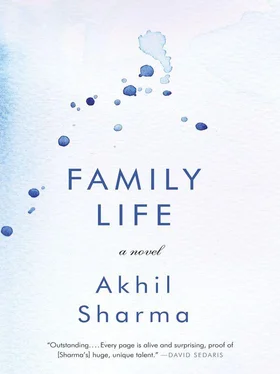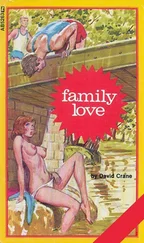Two days passed without drinking and then three. I began feeling a strange exhilaration. At school I would picture us going up the stairs with my father. I would look forward to this.
FOR SEVERAL MONTHS, my father did not drink. In my memory, this period is wonderful. Tenth grade ended, and I was again ranked first. Summer started. I turned sixteen. During those months, I was so happy that at night I had a hard time sleeping. I would be asleep, yet I would be aware of my happiness the way that, when you sleep in a room full of sun, you are aware of the light.
When he came home from work, my father was quiet, glum. Sometimes he would go upstairs to change his clothes and not come down. I would go get him, and he would be sitting at the edge of his bed looking overwhelmed. The only time my father was his old self was when he was fighting with my mother. “You don’t care. You think you know what’s right and that everybody else is a fool.” Still, the fighting was much less than it used to be, and in my view, my mother was very patient. When my father shouted at her, she listened and did not reply. Once, she told him that what he was doing was very difficult and that every day she prayed he had strength.
I was glad for our changed life. In the morning, my father descended the stairs to bathe Birju. At night, my parents no longer shouted so loudly that the nurse’s aide had to come and stand at the bottom of the stairs and call out, “Mrs. Mishra, Mrs. Mishra,” in a high, put-upon voice.
I continued worrying that my father would drink. When he got home and went up the stairs, I watched to see if he put his hand on the railing, because he used to do this for support when he was drunk. At night, if I heard the swollen bathroom door shoved shut, I would wake and lie there, even though I had checked and there was no bottle of scotch under the sink.
One evening in the fall, 6:00 p.m. arrived and my father’s silver station wagon did not swing into the driveway. My mother and I went to Birju’s room and hefted him into his wheelchair. I rolled him into the kitchen. I stood the wheelchair at the head of the table and began feeding him pureed roti and lentils.
Seven passed. “What’s happened to him?” my mother asked nervously, wiping down the counters with tight looping motions.
We rolled Birju back to his bed. The television was on. We laid him down and sat on either side of him and played cards. Birju puffed spit and rolled his blind eyes.
My father came home around nine. My mother and I stood by the living room window and watched the car enter our driveway. She, always worried about my father being drunk in public, said, “Thank God the aide isn’t here.”
In the kitchen a little later, my mother pleaded with my father. “This happens. Nobody can be perfect forever. Once or twice you make mistakes.”
My father was standing by the sink, his face dark and flushed. “Stop bothering me,” he murmured.
“Will you eat? Eat something.”
“Leave me alone.”
For a week, my father kept away from alcohol. He restrained himself without our having to stay awake beside him through the night.
He started drinking after this week and then, everything was exactly as it had been: him lying on the side of his bed, his foot on the floor; my mother standing by him and shouting; me grabbing him and yanking him and demanding he stand. Sometimes I couldn’t believe that there had been a time when he had not been drinking. In my memory, the summer that had just passed seemed long gone.
IN ELEVENTH GRADE, I took the PSAT. I met with my guidance counselor for help on deciding between various colleges.
Periodically Minakshi and I went to the movies. We would arrive separately, telling our parents that we were meeting friends. Being happy, I looked down on my parents for their unhappiness. I blamed them for it the way the rich cannot help but think that poor people must bring their poverty on themselves.
At home there were endless new humiliations: my father in Birju’s room late at night, drunk and sitting at the edge of the small circle of light cast by a table lamp, a Haitian aide looking at him as he talked about how happy he was.
My father loved drinking. Later he would tell me that drinking was freedom, peace of mind, that he felt like he was surrounded by problems and when he drank, it was as if the alcohol plucked him out from among them. He once said that he would get angry that he didn’t weigh more, because if he were heavier he would be able to drink larger quantities before passing out. Also, he told me that it was around when he started drinking again that he realized that he could not stop drinking, that he had no choice in his drinking, that when he brought the bottle of scotch to his mouth, his hand would keep pressing it to his lips even after he wanted to stop drinking. He said that he would feel as if the hand belonged to someone else.
To be hungover all the time was awful. He said that in the morning he would be in his car driving to the train station and, when he heard people on the radio, it was as if they were broadcasting from another country, that he was in a country where there was a war going on and these people were broadcasting from a nation that was at peace.
One night, while drinking in the bathroom, my father suddenly became captivated by the romance of standing outside in the snow in the backyard. He went downstairs, walked outside, and stood under the quiet stars. There was a two-inch layer of snow, and he was wearing rubber slippers. The snow did not bother him, he later told us. He felt very proud standing there. He thought about how far he had come. In India he had never seen snow and neither had his father or grandfather, and now he was living in a country where it snowed every year.
After standing in the snow for a little while, my father decided to sit down. He did so. His buttocks felt cold for a moment, and then they were OK.
THE NURSE’S AIDE woke us. “Mrs. Mishra,” she called from the bottom of the stairs. I woke and lay on my side and heard a mumble of voices as my mother and the woman talked.
My father had left the back door open. The aide had gone into the kitchen to get a half-full open can of Isocal formula from the fridge.
“You could have died,” my mother said, rubbing my father’s back with a towel as he sat on their bed in his underwear, his feet in a pail of warm water.
A month went by. My father kept drinking. One night, he did not come home.
“He could have fallen asleep on the train,” I said. My mother and I were in the living room looking out at the empty driveway.
“What kind of life is this?”
Ten came, and the car that pulled into the driveway was the aide’s. By eleven, I knew that something was very wrong. I sat in my room, my back to the wall, and wrote about a man who is waiting at home for his alcoholic wife and who hates himself because he is scared and feels he can’t be as angry as he wants to be. As I wrote, I felt proud at my toughness for taking whatever was happening to me and turning it into something else.
Around one, my mother came into my room. I was still writing. “Ajay, let’s go to the train station.” I got out of bed without saying anything. I thought I could include this trip to the station in my story.
The train station parking lot was vast and mostly empty. Every twelve parking spaces there stood a tall light. My mother and I drove up and down the rows. Sitting by my mother, I felt such overwhelming shame that when cars passed by on a nearby road, I worried that the drivers of these cars might see us and wonder what we were doing. I thought this response would be a good detail to put in my story.
The station wagon was parked facing the road. We pulled up behind it. My mother got out and walked around the car. Periodically she brought her face to one of the windows and peered inside.
Читать дальше












